Culture Clash by Laura N. '09
Spain doesn't do sarcasm, and my soul is slowly dying. But then I took some pretty pictures, and it was all okay.
In my last entry, Meagan said, “Anyways, could you please do an entry on some of colloquialisms that you are learning? That would be awesome. :]”
Yeah, sooooo, I’d love to, but see, most of the words that my new Spanish friends have taught me may not exactly be appropriate for posting here. Seriously, a couple of weeks ago as we sat in a bar and watched Spain beat Russia in the qualifying rounds of the Eurocup, they taught us Americans all the important insults they thought we needed to know. But let’s see if I can find something useful AND repeatable. =)
Okay, first of all: the famous breakup phrase. In Spanish, “It’s not you, it’s me,” becomes “no eres tú, soy yo.” The translation is almost exact: “you are not you, I’m me.” So, the English makes more contextual sense (what you’re really saying is “the problem IS not you, the problem IS me”), but the Spanish makes more grammatical sense, because you actually conjugate the verb to match the subject. The same thing happens when you answer the phone, “soy yo” (“I am me”) instead of “it’s me” (“the person you are talking to is me”). I might be turning into a linguistics nut, but I find this utterly fascinating.
I’ve always hated the expression “the straw that breaks the camel’s back,” because it’s so useful but so ugly! I mean, a camel? Come on. Where did THAT come from? Why isn’t it at least a horse or something? Well it turns out that the Spanish expression for this is “la gota que colma el vaso,” or “the drop that overflows the glass,” which I think is a much better expression. Now I can just switch to Spanish when I want to express that idea.
Which is the beauty of knowing 2 languages. I’m finding that sometimes I just need to switch to Spanish. You know how when you can’t think of the exact word you want to use to describe something, there is this feeling of relieved satisfaction when you finally figure it out? It’s actually kind of silly, because you never really need that exact word, you get your point across just fine by basically describing the definition of that perfect word. And often your friends will say, “ah! I know exactly what you mean, but I can’t think of that word either!” At that point, the continued pursuit of this word is sort of pointless, but you do it anyway, for that great moment when you say, “aha! That was the word I was thinking of!”
Well I’ve found that sometimes Spanish just gives me that more satisfied feeling. And it’s usually for the stupidest words. For example, for some reason I cannot figure out, I just much prefer the word “parecido.” It means “similiar,” as in “these books are very similar/estos libros son muy parecidos.” I mean, of all stupid, boring words. But for some inexplicable reason, “parecido” just says so much more about the relationship between the books than “similar,” and I have no idea why.
Also, perhaps one of my favorite Spanish words ever is “desafortunadamente,” which means “unfortunately.” This one makes a bit more sense, because this is a word with some meaning behind it. And for me, “unfortunately” just falls flat on its face. “Desafortunadamente,” on the other hand, has…more…umpf, yeah? Try it. I think you’ll agree.
Another great Spanish word is “tonterías,” which are stupid little things. It’s basically the word “nonsense” in plural noun form, and I absolutely love it.
I’m coming to realize more and more how few words have exact translations. Gato is cat. Ok, that’s pretty exact. “Gato” and “cat” are the same word. “Parecido” and “similar” are aaaalmost the same word, but not quite. “Nonsense” and “tonterías” are NOT the same word. I double checked this theory with my friend Martin, who is natively bilingual, to make sure I wasn’t just making things up. And he completely agreed with me, “yeah, parecido and similar are different words, aren’t they?”
Also, cursing. This is quite amusing. I will try to explain this without getting too inappropriate. The basic point is that even though curse words have exact translations, they have completely different contexts.
For example, the “f word” in Spanish is “joder.” But, it’s not nearly as strong of a word in Spanish, so I don’t feel out of line putting it in this blog. They definitely mean the same thing, but “joder” is more like “damn” in usage, which is a much more mild word in English. Also, the most offensive English curse word I can think of becomes a filler word in Spanish. I’m not even kidding. It means like…”wow.” Which is a pretty striking difference! Part of this is that Spaniards curse more, I think. (Seriously, I lived in the US (in New Jersey, no less!) for 21 years and Spain for a month and a half, but I think it might know more Spanish insults than English ones.) But also the words just have different cultural significances, because there are Spanish curses which are stronger than their English counterparts…but now I’m really getting into territory where I can’t continue without insulting someone, so let’s move on.
One last language note: Spanish has 2 useful expressions: “me gusta” and “me cae bien,” which mean almost the same thing.
“What do you think of my friend?”
“Me cae bien” = I like him, he seems like a cool guy.
“Me gusta” = I like like him.
So, first of all, cuidado! (Be careful!) Because “me gusta” is definitely the only one of those I ever learned in school- you use it for everything. I like the beach, I like apples, I like to read, blah blah blah. BUT you can see how easily you can get into trouble if you don’t know the connotation it takes on when used with people!
And second of all, how AWESOME is that! So useful! I really wish English allowed you to make that distinction without sounding like you were in the 3rd grade, you know?
Here are some other, non-linguistic observations about Spain:
1. Man, people in this country sure love their shoes. I think the number of shoe stores in this city rivals the number of grocery stores. I really not exaggerating.
2. I love that you can go to the grocery store and buy olive oil by the gallon. In fact, it’s hard to buy it in anything smaller than a gallon.
3. Age is perceived different here. I am much younger in Spain that I am in the US. It was a little annoying at first (someone actually said to me: “You’re how old?! Oh my God, you’re a baby!” …exact words) but I’m kinda starting to like it. Maybe it means I don’t have to grow up yet.
4. They don’t do sarcasm! Oh my God it’s awful! How will I ever survive?! Seriously, humor here is very differet. During my first week or two, I went out with a bunch of friends and made a sarcastic remark. I was met with a moment of silence, followed by one guy saying, “Oh! She’s being sarcastic, that’s funny!” and in that moment, I KNEW I was in trouble. Spanish sense of humor is very cheesy, I’m sorry to report.
For example: I lost a lot of weight recently, so much so that a lot of my clothing doesn’t fit me anymore. To get this joke, you have to understand the verb “quedar.” It’s one of those words that means like a million things, but you only need to know two of those meanings: primarily, it means “stay.” “Voy a quedar aquí” = “I’m going to stay here.” But, it can also mean “fit,” as in “my clothing doesn’t fit me” = “mi ropa no me queda”
So, the following exchange occurred between myself and a coworker.
Me: “My clothing doesn’t fit(stay) me!”
My friend: “Is it running away from you? Hahaha!”
Basically, it’s the Spanish equivalent of “is your refrigerator running?” and my coworker actually thought it was hilarious.
Still on the sarcasm theme, the most frustrating thing ever happened today. I didn’t have a great day, was sort of in a lousy mood, and my friend and I got into something of a fight.
Me: “You know what, I’m sorry I’m not having a good day, maybe you should just go talk to someone else.”
Spaniard who doesn’t ever hear sarcasm, ever: *confused look* “Are you being sarcastic?”
Aarrrgghhh! Please, for a moment, just imagine this. You are really frustrated, fighting with someone, and just want them to leave you alone. So you say, “I’m sorry my bad day is bothering you, just leave me alone.” And then you have to EXPLAIN what that means to them. I don’t think words can adequately express the frustration I felt in that moment. Ha!
I leave you with some random photos of Madrid. Enjoy.

Okay, do you see this building in this picture? This huge, enormous, palace? That’s the post office. I’m not even kidding. It’s even officially called “El Palacio de Comunicaciones.” That’s right, the Communications Palace. I think it’s the most absurd thing about this city. I went in there once and almost got lost. I had to go to the information desk. (Just let that sink in for a minute…the post office has an information desk.) And I asked the woman, “Um…I just wanna buy some stamps?” And do you know what she told me? “Go to window thirty one.” Thirty one! If window thirty one is for stamps, what exactly are windows one through thirty for?!?!

This is Cibeles, it’s a famous statue right in front of the “Communications Palace.” The thing about Madrid, is that there’s not much to do in terms of sightseeing. If you read any travel guide info about Madrid and look at the top ten things to do, it will include coming to take a picture of this statue. And I mean, it’s kind of a cool statue but…really? Anyway, this is the “Plaza de Cibeles,” where all the hard core partying happened after Spain won the Eurocup.

El Palacio de Cristal (The Glass Palace) in Retiro park.

It’s so pretty.

I absolutely love Retiro park, it’s so beautiful and peaceful. Right after taking the above pictures I settled into the grass to read for awhile. When I noticed this tree. Okay, this tree just waiting for you to climb it, isn’t it? So that’s what I did after taking this photo. =)
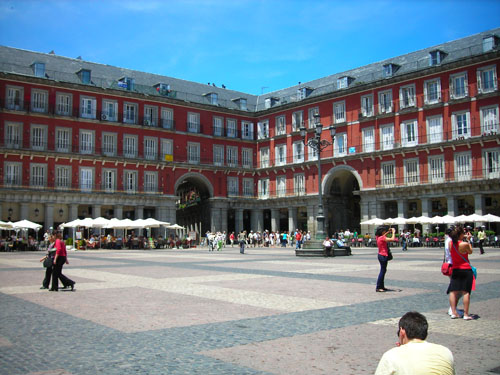
La Plaza Mayor. Another one of those overrated “Top Ten Things to do in Madrid.” You go there so you can say you’ve been there, basically. Apparently this is where super important things used to happen back in the day, like the crowning of a new king and such. By the way, my commentary on overrated sightseeing is not at all meant as a bad thing- it’s just that Madrid is a city to be experienced more than seen. You come here to go out for tapas and stuff, not to see pretty things. So the sightseeing lists really have to stretch it…
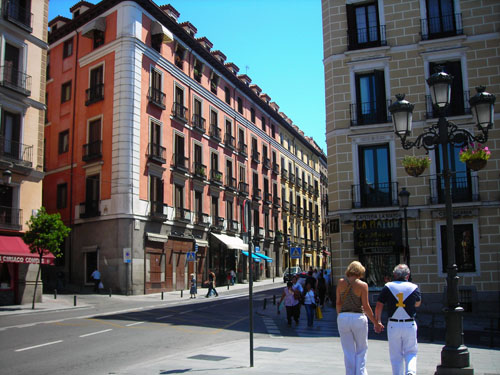
A random street. Okay, it’s not really random, it’s La Calle Mayor, which runs between La Plaza Mayor and El Palacio Real (The Royal Palace), but it’s pretty typical of Madrid. I love the colors, personally.
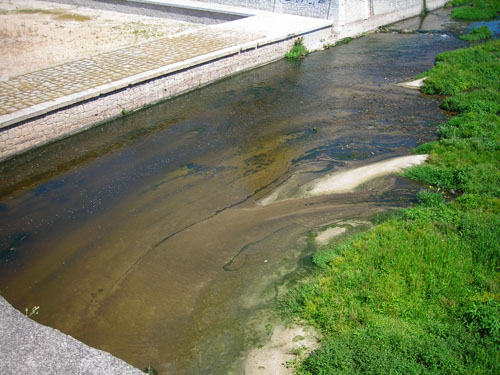
El Río Manzanares. Madrid is home to what is probably the world’s lamest river. Seriously, it’s a creek.
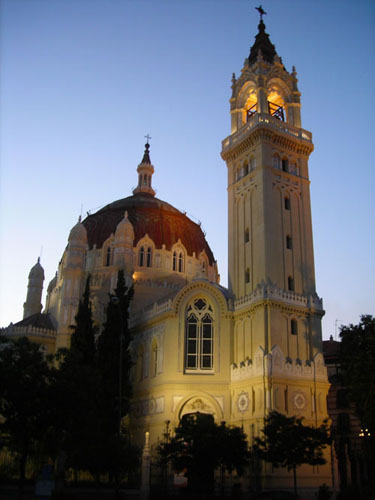
I have no idea what this building is. But I noticed it when I was walking home at dusk one day. And it was pretty, so I took a picture.

Speaking of pretty, check out the colors in my hallway.
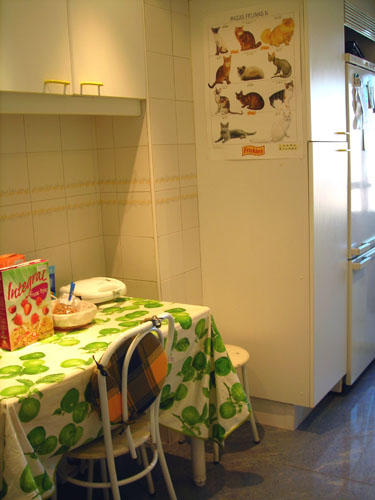
Where I eat breakfast every morning.

The living room in my apartment. Check out that bookcase. I am all about the bright colors lately. Isn’t this place awesome?
Congratulations, you have just been taken on a virtual tour of like, 5 of the top 10 things to see in Madrid, plus my house. So if you ever visit, skip the photojournalism tour, and just go out for a drink instead. ;-)
FIRST?! Holy crap!
Anyway, Spain looks so amazing. I’ll say again I wish I could visit there before. Hopefully, I will be able to in the future.
And the clothes fitting you joke I actually found pretty amusing, mostly because I’m in Spanish and I was imagining that conversation actually happening.
By the way, I would just like to state that July 9, 2008 will live in history as the day I managed to get first comment on the MIT Admissions Blog, and with a meaningful comment to boot.
Hahaha I can relate to this post sooo much. I’m lucky enough to have a group of friends at MIT that are ethnically diverse (half-german, mexican, vietnamese, burmese…), yet they all speak Spanish to a certain extent, so they understand me when I have to speak Spanish because what I want to say is hard to translate to English. It’s good to be able to switch back and forth between English and Spanish.
And the sarcasm thing might only be in Spain, because sarcasm is highly used and appreciated in Puerto Rico.
Dude! Desafortunadamente is my favorite word in Spanish! Also, I know what you mean with the English-language-inadequacy thing; for instance the word “actuál” meaning something close to “the part of the thing that is really the thing” except there’s no good way to say it in English…but in Spanish it’s just awesome!
hahaha I love how much you love the Spanish Language, it really motivated me to make an effort to learn it even though it is really hard for me because last fall was the first time I started it was last fall and we had to go through SO much in just 9 months of junior year.
Btw, isn’t Caber to fit in Spanish?
My favorite Spanish word is “fregadero”. It sounds dirty, but its not.
I thought about the same things when I was learning english back in the days… But the thing I really love about english is that there is only a “you” instead of “usted, tú o vos” in spanish, it drives me crazy, when I meet a new girl I never know what “you” I should use.
Por cierto, entiendo a que te refieres cuando hablas de las groserías que los españoles usan como “fillin words” y específicamente a que palabra haces referencia, porque para un latinoamericano “la palabra con c” también es bastante vulgar.
By the way, for me (a native spanish speaker), hearing the “f word” is less strong than hearing “joder” or the many other ways of expressing the same thing… I guess is the same effect it has on you.
My favorite spanish word is saltamontes. It means grasshopper, but if you break it down, it’s “leaps mountains.”
I have to say Laura, this is probably my favorite post of yours. Maybe I just haven’t read your blog enough, but seriously, awesome post!
Also, I don’t think I would be able to make friends in Spain now. I don’t think I could ever part with sarcasm. Not even restrain it.
I love English, but of course love also to pick at its faults, and the one that annoys me the most is the lack of any equivalent of “you guys”. “You” has come to be taken as singular in most situations, making “you guys” a necessary evil. Yuck.
And of course there are also all the he/she him/her problems, but I have yet to hear of a language that has a good solution to that. Others do seem to have the “estas/estan” distinction down.
Laura, I’m incredibly jealous of you =P. (Though I prefer the camel’s back to be broken. My horseback rider said objects to having these animals harmed =D.)
AND CHEESY IS AWESOME!
Lainers, interesting you should say that, as “you” originally was English’s second person PLURAL pronoun. It also conveyed respect, and thus was used more and more generally till it crowded out “thou”, the original second person singular pronoun, entirely.
And there’s a solution to the “you guys” clunkiness: Y’all. Elegant and precise.
^ My Latin teacher liked to use “y’all” too. When we’re translating a 2nd person plural, it’s just so much more precise than just “you”.
My friends make fun of me when I use y’all….
It is precise =D. I’m not sure I would call it elegant.
^ My Latin teacher did that, too. Always said it with a Southern drawl, to boot, thugh he was from California.
I also agree about Spanish. There are a lot of things that are easier to say in Spanish.
Doesn’t “me cae bien” literally mean “sits well with me?”
Hey! I was there when you took those pictures! Whoo-hoo! Also, yay for new apartment pics. It looks considerably more awesome than the apartment of she-who-will-not-be-named (my offer to go tackle her still stands, by the way!).
Another Spanish difference – the word “puta” can mean everything from beautiful woman to tramp to b-word depending on the region (in Mexico, it’s *not* a compliment).
how are parecido and similar different?
also, it should be “estos libros son muy parecidos” not “estes libros son muy parecidos”
@Anonymous
But you see my modern-day predicament, don’t you? If pushed to certain extents, I will use any word necessary, but even digging up “thou” won’t help me, because I have a perfectly good word for that! I didn’t know “you”‘s history, though, so thanks much for that. And sorry, I’ve tried “y’all”, but by all accounts I sound ridiculous.
What about solutions to either the “in such cases, let the student take their exam” or “in such cases, let the student take his/her exam” ugliness? (Okay, in that poor example, “in such cases, let students take their exams” works adequately, but there are many that are not so easily ammended).
I really wish that neutral pronouns would go into popular use. I’m starting to use “xi” in non-scholastic writings =P.
… I use it and I can’t even spell it. *xe
I live in Spain, although I live in Marbella, which is about as South as you can get without being in Africa. I must agree with the linguisticism.
What’s also cool is that you can call a thing by an adjective. “Eres un impaciente” means “You are an impatient person”, but you don’t need the ‘person’ – you can just refer to the object by its adjective. Pretty cool, no?
Hey! These pictures are awsome. They are great. I enjoyed it.
Also your home is very beautiful. I like it.
—————————————————————-
A request:
I need some help for continuing my education in MIT, I want to know if it is possible for you to help me just with E-mial. I just want to ask you some questions.
If you help me I will be grateful.
Funny, but what you describe as ‘sarcasm’ does not seem sarcastic at all in a European context. When we say ‘sarcasm’ we mean really black humor, ironic, sometimes admitteldy not very PC but rarely insulting to your counterpart. I am from Germany (yes I know, the country that sterotypically lacks humor) and have to say my first impression when coming to the US was that many people here do not get sarcasm. I always got these terrified looks when I cracked a stupid, sarcastic joke, especially when it was borderline non-PC.